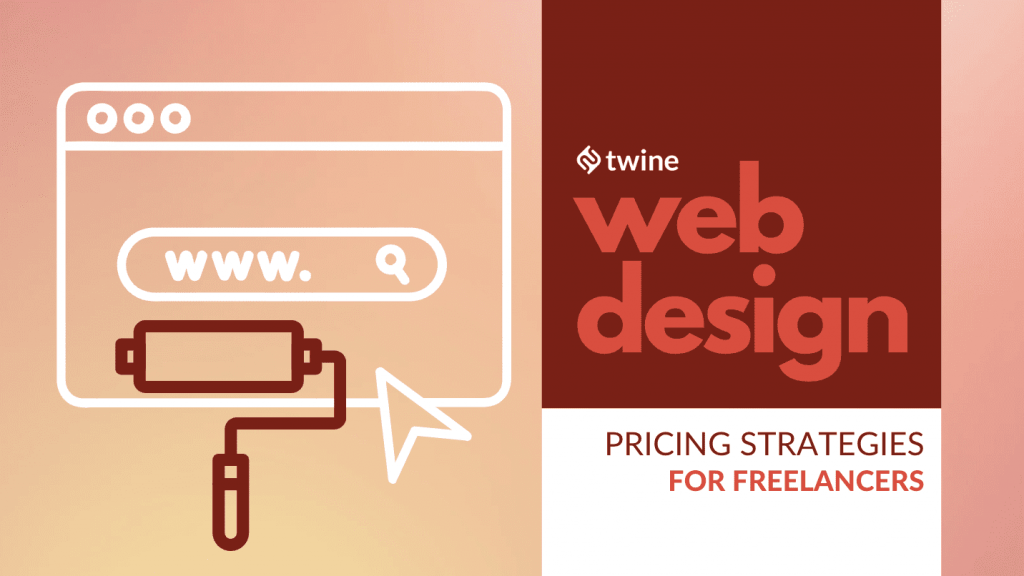For more Web Tools, check out the Freelancer Toolkit…

As a freelance web designer, you know the value of your time and expertise. Ensuring you are compensated fairly for all the hard work that goes into designing websites is crucial. So how do you guarantee that your web design pricing rates accurately reflect what your services are worth?
Securing the pay you deserve as a freelance web designer is critical, so take advantage of these tips and tricks to ensure that happens.
From learning market rates to comprehending your client’s budget, use these helpful strategies for commanding what you’re worth with your web design pricing.
Ready? Let’s dive in.
Hey! We’re looking for Web Designers to work on these projects…
Understand Market Rates for Freelance Web Designers

For freelance web designers, understanding current market rates is essential for charging what you’re worth. Knowing industry standard rates helps you determine the price point that will allow you to compete while also achieving a return on your investment that is fair and equitable.
Additionally, without this knowledge, it can be challenging to identify whether or not you are receiving fair compensation for your work.
Moreover, understanding market rates also helps set expectations with clients and ensure that they are aware of the value of their project, so they know the cost associated with it.
Additionally, understanding how much other companies, such as new LLCs or established businesses, pay for similar services allows freelance web designers to charge adequately for their services accordingly. Finally, by being informed about the industry’s current pricing trends, freelancers can ensure they offer competitive prices based on the scope and complexity of their projects.
Furthermore, knowing current market rates gives web designers a better idea of how much to charge based on their experience level and expertise. For example, experienced professionals can command higher fees than those just starting to reflect their additional skill sets.
In contrast, beginner-level web designers might need to adjust their web design pricing downward to attract more clients. Finally, understanding market rates allows freelancers to accurately assess their value to ensure they are adequately compensated for their work.
Research Your Client’s Budget

As a freelance web designer, it’s essential to research your client’s budget when setting the right price for your services. Knowing how much money your client has allocated for the project and what they are willing to pay is essential in ensuring you get paid what you are worth.
By researching their budget, you can determine whether they can afford your services and how much they should pay. Additionally, analyzing their budget allows you to set realistic prices that will enable you to make a comfortable living without undervaluing your services.
When researching a client’s budget, a few key factors must be considered:
- Consider the project’s scope and the work scale required. This will help you decide on reasonable pricing and clarify which tasks and time frames each requires.
- Do some research on market trends to keep up-to-date with industry standards when it comes to pricing projects and services.
- Consider any additional costs, such as hosting fees or other third-party services which may be required for the project, as these need to be factored into the project’s overall cost for both parties.
Set Your Prices and Stick to Them

Freelance web design is an incredibly competitive field, and figuring out how much you should charge for your services can be daunting. When setting and sticking to prices, freelance web designers need to consider their worth and base their prices on that.
A good starting point is looking at the market rate for web design services in general and what other freelancers in the same field are charging. It may be tempting to undercut others to get clients quickly, but setting your prices too low can devalue the skills you possess and discourage clients from returning for future projects.
When setting a price for a project, it’s essential to consider all of the time and effort to produce a quality website, such as researching material, developing content, designing visuals, coding the site, etc.
It’s also wise to factor in additional freelance business costs, like software subscriptions or business insurance. Once you have determined your rates based on these factors, ensure consistency when quoting jobs by using set rates rather than always customizing quotes based on individual projects.
As a professional freelance web designer, it’s important to remember that your work has value and not undersell yourself for fear of not being able to compete with other designers in the same space.
However, do your research and set reasonable prices for your work that reflect the current industry rate and the amount of time involved with each project accordingly. Clients will understand what they are getting from you regarding quality services and results – which is worth paying for.
Negotiate When Necessary

Freelancers don’t typically have the same salary or benefits that come with a traditional job; thus, they must be able to stand up for themselves to charge what they’re worth. Therefore, you will want to ensure clients understand your value and negotiate for a fee that reflects that.
It’s essential to articulate effectively why you are worth what you’re asking for. Research before negotiating can help you establish benchmarks for yourself and demonstrate why your rates might differ from someone else’s.
You should also use concrete facts and figures (such as how long it takes you to complete specific projects). By backing up your request with tangible evidence, it can make it easier for the client to understand that you are worth what you are asking for.
Another way freelancers can demonstrate why they deserve more is by highlighting additional skills they possess. For example, some web designers have coding experience, graphic design capabilities, or expertise with digital marketing trends, etc. Subsequently, these designers stand out from the competition.
Not only does this show you have more knowledge than others, but proves that working with you will provide more value than a less experienced freelancer.
Lastly, remain confident throughout the negotiation, and don’t be afraid to speak up if something isn’t fair or equitable. Many freelance web designers struggle with self-doubt but remember – if you don’t stand up for yourself, who will?
As long as you trust your skillset, stay persistent, and remain confident in your ability, there’s no reason why clients won’t recognize your true worth.
Don’t Undervalue Yourself or Your Work

Undervaluing yourself and your work can lead to a variety of problematic issues. Most notably, it affects your financial security. As an independent contractor, if you don’t charge enough for your services, you won’t be able to make ends meet. This could lead to stress and anxiety about finances, making it difficult for you to focus on providing quality services.
It’s also essential to consider the impact of undervaluing yourself on other web designers in the field. When one web designer charges too little for their services, it creates a downward cycle affecting everyone in the industry.
If everyone follows suit and starts charging less than they should, no one will be able to sustain their business or make ends meet each month.
On top of all this, undercharging for your services can affect how clients view you. For example, suppose clients consistently pay too little for quality web design work.
In that case, they may expect more from designers but are unwilling to pay normal market rates for such services. This leaves freelancers feeling taken advantage of or resentful after completing assignments. This can negatively affect client relationships and professional reputation – something no freelancer wants.
Be Ready to Walk Away if Necessary

Working as a freelancer can be full of uncertainty and difficult decisions. Often, walking away from a client or project is the best decision you can make as a freelancer. If you are consistently undervaluing your services or taking on projects that don’t pay you what you deserve, it can have an effect on your career success and sustainability.
It’s essential to stay confident in your web design pricing structure and not compromise on the value of your work. Walking away from a client if they won’t pay what you’re asking shows that you know how much your services are worth, and that they need to meet that standard.
Learning how to communicate effectively with potential clients can help make walking away easier. So, set clear expectations at the outset of any project. These boundaries include the time and effort you’re willing to put into a particular project, helping prevent situations where you find yourself overworking for lower compensation.
Asking friends within your network who do similar work is also helpful for understanding the rates for specific jobs. This knowledge will help give you confidence when charging appropriately for your work.
Finally, ensuring a variety of clients also means that if one doesn’t value your work enough, other prospects will.
Conclusion
It’s important to remember that as a web designer, you are providing a valuable service. This service cannot be replicated or undervalued.
Therefore, it’s essential to have confidence in your skills and knowledge when setting web design pricing rates for your work. This is so you don’t shortchange yourself or other freelancers in the same field.
Doing so will help you live sustainably as an independent web designer and protect your business from potential financial ruin!
Want to be recognized as an expert in your field? At Twine, we have dozens of top-quality jobs being posted each and every day. There is a job waiting for your skills in everything from design to marketing, development, and copywriting. Join the marketplace of diverse creative talent here.








